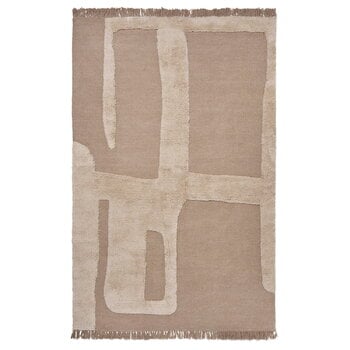Ferm LIVING's Alley wool rug brings a soothing and warm atmosphere to the décor, without compromising on style. The soft, hand-woven rug made from New Zealand sheep wool is decorated with a fun tufted pattern, with relaxed fringes to complete its jovial look. The Alley wool rug is a beautiful and practical piece that perfectly complements the atmosphere in all spaces from the living room to the bedroom, and the thick rug also works wonders on acoustics.
Alley wool rug, 160 x 250, natural
ferm LIVING
Description
Ferm LIVING's Alley wool rug brings a soothing and warm atmosphere to the décor, without compromising on style. The soft, hand-woven rug made from New Zealand sheep wool is decorated with a fun tufted pattern, with relaxed fringes to complete its jovial look. The Alley wool rug is a beautiful and practical piece that perfectly complements the atmosphere in all spaces from the living room to the bedroom, and the thick rug also works wonders on acoustics.
Product details (7)
- Material
-
100% New Zealand wool,
hand-woven and hand-tufted - Colour
- Natural
- Length
- 250 cm
- Width
- 160 cm
- Height
- 3 cm
- Weight
- 7.4 kg
- Care instructions
- Vacuum clean only
- Product ID
Reviews (1)
4
Based on 1 reviews
-
K
Kristine H
Drammen, Norway
Quick delivery, though not to the door as it said in the order. The rug is beautiful. Somewhat thinner than I thought, but I like it 😊
278 days ago
Sustainability
The Product Sustainability Framework, our criteria of sustainable design, helps you find the most sustainable products in our selection. Read below which sustainability criteria this product has met.
Working conditions & labour 8/9
-
Equal opportunities for all employees
-
Commitment to UN Global Compact, fair compensation for all employees
-
Corporate responsibility requirements defined and communicated for suppliers
-
Systematic work for improved inclusion and well-being in the workplace
-
Transparent supply chain
-
Suppliers' compliance to a code of conduct ensured
-
Direct suppliers audited and certified
-
Compliance to the UN Guiding Principles on Business and Human Rights ensured in the supply chain
-
Support for community involvement in the supply chain
Eco-friendly production 8/9
-
Fair and resource-wise water-use in production
-
No incineration or landfilling of returned items
-
No use of endangered species as materials
-
No direct environmental emissions or waste (excl. GHGs) from production
-
The sustainability of direct suppliers' production is addressed and monitored
-
Production and material sourcing that respect biodiversity, animal rights, and natural ecosystems
-
Material-efficient and ecological packaging
-
No potentially harmful chemicals used in own production
-
Positive impact on nature’s well-being through operations that regenerate natural ecosystems
Climate impact 5/8
-
Company's direct greenhouse gas emissions identified and commitment to reduction
-
Product's carbon impact identified and commitment to reduction
-
Guidance on energy- and eco-efficient use of the product
-
Contribution to climate initiatives beyond the brand’s direct operations
-
Carbon footprint of the product calculated and goals set to reduce it
-
Low-carbon or compensated transportation
-
100 % renewable energy in own production and operations
-
Carbon neutral or carbon negative product
Sustainable materials 6/6
-
Sustainable and long-lasting material choices
-
No harmful or hazardous substances
-
Responsible raw material sourcing and production
-
Materials suited for circularity: monomaterials, recyclable finishings, renewable or recycled contents etc.
-
Ecological materials: natural, biodegradable, recyclable or recycled contents
-
Outstanding materials in terms of innovativeness, responsibility, sustainability and circularity: local production or sourcing, 100 % recycled content, C2C-certification etc.
Circular design 4/5
-
High aesthetic quality promoting long-term use of the product
-
Technically durable product design and material choices
-
Design for enduring life-long quality
-
Design and support for product maintenance, repair and upgradability
-
Innovative circular design solutions: circular service system, resale platform, remanufacturing, collection of used products, etc.












